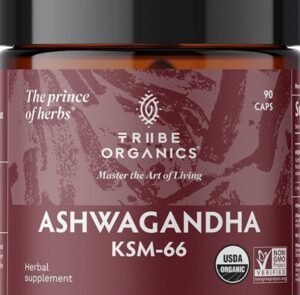Ashwagandha, also known as Indian Ginseng and Dunal root, is a traditional Indian medicine that has gained widespread popularity recently as a natural remedy for stress, anxiety, and various health concerns due to its alleged adaptogen effects. While generally regarded as safe, ashwagandha can interact with certain medications, potentially leading to adverse effects. Understanding these interactions is crucial for ensuring this herbal supplement's safe and effective use.
Why Do People Take Ashwagandha?
While there are studies revealing the herb may have a spectrum of effects, most often, ashwagandha is used to help these three health problems:
- Improve insomnia
- Reduce chronic stress
- Reduce anxiety
How Much Ashwagandha Works?
The effective dose would depend on what you are taking it for. Studies have used up to 1000 mg per day. Splitting it up into smaller amounts is likely preferable to taking one large dose.
As a rule of thumb, take less for the first week or so to give your body time to adjust. Also, if side effects are going to occur, taking less than a company recommends should help minimize adverse reactions.

The active ingredients in ashwagandha are thought to be compounds called withanolides. There are over 900 types of withanolides. One of those types – called Withaferin A- has received considerable attention from researchers. Thus, you may see this form listed on the Supplement Facts labels.
In addition, supplement companies may refer to the percentage of withanolides their products contain. Supplements often contain between 1% and 10% of total ashwagandha withnolides.
KSM-66 refers to a patented form of ashwagandha that has been the subject of over 20 clinical trials. The company that makes KSM-66 licenses it out to others to use in their ashwagandha supplements.
Ashwagandha's Impact on Blood Sugar Regulation
Ashwagandha's potential to lower blood sugar levels has raised concerns about its interaction with diabetes medications. Studies suggest that ashwagandha may enhance insulin sensitivity, and promote glucose uptake by cells. This effect might enhance the action of antidiabetic medications such as metformin, leading to hypoglycemia or excessively low blood sugar levels.
While obviously concerning, most of this evidence stems from research involving laboratory animals and isolated cells. Definitive proof that the herb is dangerous to people with diabetes requires more study.
Possible Medication Interactions: metformin, insulin, sulfonylurea drugs, Ozempic, and others.
Ashwagandha's Influence on Blood Pressure
Ashwagandha's hypotensive effects have been observed in clinical trials, with some studies demonstrating a significant reduction in both systolic and diastolic blood pressure. This property raises concerns about its interaction with antihypertensive medications, as the combined effect could lead to an excessive drop in blood pressure, causing dizziness, lightheadedness, and even fainting.
While this is very alarming, these side effects have not been confirmed to occur in people who take ashwagandha supplements.
Possible Medication Interactions: diuretics (e.g. hydrochlorothiazide), beta-blockers (e.g. Lopressor), calcium channel blockers (e.g diltiazem), and others.
Ashwagandha and the Immune System: A Delicate Balance
Ashwagandha's immunomodulatory properties, while beneficial in some contexts, can pose a risk when interacting with immunosuppressants, medications used to suppress the immune system in conditions like autoimmune diseases and organ transplants.
In one clinical trial 60 mg of ashwagandha was demonstrated to boost various immune system defenses, including natural killer cells, antibodies, and cytokines, after just 30 days of use. This immune system stimulation could counteract the desired effects of immunosuppressants, potentially leading to adverse consequences.
Possible Medication Interactions: cyclosporine, cyclophosphamide, and others.
Potential Interactions with Sedatives and Anticonvulsants
Ashwagandha's sedative effects, including drowsiness and sleepiness, have been reported in some studies. This property raises concerns about its interaction with sedatives and anticonvulsants, medications used to treat seizures and anxiety disorders.
The combined sedative effects could lead to excessive drowsiness, impaired coordination, and even respiratory depression.
Possible Medication Interactions: benzodiazepines (e.g., valium), barbiturates (e.g., phenobarbital), anti-seizure drugs, alcohol, melatonin, glycine, CBD, and others.
Ashwagandha's Influence on Thyroid Hormones
Ashwagandha's potential impact on thyroid hormones has been suggested in some research, with some studies indicating an improvement in thyroid hormone levels in humans. This effect raises concerns about its interaction with thyroid hormone replacement medications, as it could potentially interfere with the desired hormonal balance. Ashwagandha might interfere with the TSH blood test analysis.
Possible Medication Interactions: Synthroid (levothyroxine), vitamin D, black seeds (Nigella sativa), and others.
Video: Ashwagahdna Hypothyroidism Research
Watch on my YouTube channel
Navigating Ashwagandha Medication Interactions Responsibly
While ashwagandha appears to offer a range of potential health benefits, it is crucial to approach its use with caution if you take medications. Before initiating ashwagandha supplementation, consulting with a healthcare professional is essential to assess potential interactions and ensure its safe and effective use.
Let's set up a private consult and discuss the pros & cons of the supplements you are taking. Email me here.

Where can I find your reviews/comments on anxiety supplments? I am taking Life Seasons’s “AnxieT” and bought but have not taken it yet Gaia’s “Kava Root”. Also, is there any other supplement that you would recommend for anxiety that is both effective and doesn’t have damaging side effects?
Thank you very much.
Hi Graziella, I have several videos of products like that on my youtube channel https://youtube.com/playlist?list=PLmliBwDoqUP8CBfmm62emE4lEHgqhIQb7
Here are some on this website too
Magnesium and depression
SAMe Review
Ashwagandha review
Relief Factor review
I have not heard of the AnxieT supplement but I see it does have ashwagandha. It also has theobromine which, while it looks like “caffeine” appears to have calming effects.
If you have any other questions just ask and I’ll try to help.
Hi Joe, I’m wondering if you have any resources that suggest dosing for best effects for vitamins/supplements? Perhaps some type of chart?
Info like:
-time of day
-with or without meals
-other supplements okay at the same time
-what supplements not to take together
-mg/kg of body weight
-before or after exercise
Thank you
Hi Paul that is an excellent question! In general its best to take supplements with food to reduce GI upset symptoms like stomach cramps. I also feel its best to start with less than a company recommendds for at least the first week to reduce any possible side effects and give your body time to adjust. Generally amino acids are better absrobted on an empty stomach but since amino acids are naturally found in foods, I dont feel this difference is much. Same thing with water soluble vitamins (C and Bs).
With some of your other questions its a bit more complicated like for example before/after exercise and dosing in terms of mg/kg. If we are basing a dose on bodyweight this can vary from supplement to supplement and not all supplements have this kind of data.
I’ll check more into this and see what I can put together. Thanks for the idea 🙂
Thanks for posting. I sent forwarded email to my husband who takes a diuretic with his other BP med (an ARB). I no longer take ashwaganda but may restart due to the immune defenses. The only medication I will be taking is Evenity in the form of a monthly injections. I have read that Prolia may have immunosuppressive activity but this has not been demonstrated with Evenity as far as I know, and I spoke with the pharmacist who works with the doctor who is prescribing it.
Hi Judy, Im not familar with the Evenity medication but did look it up (as you know its for osteoporosis). As a pointed out, Ashwagandha seems to regulate some functions of the immune system. That’s interesting but the real test is whether it reduces colds and flu. I need to look deeper into that research. Its on my list. While it might help, as you know the best way to keep your immune system strong is exercise and more fruits and veggies 🙂